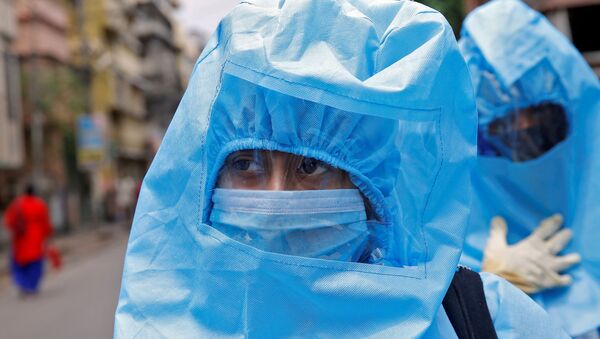“It is a rare privilege to get a chance to save someone’s life. There is no bigger good deed than this,” Delhi Chief Arvind Kejriwal appeals in an advertisement to patients who have recovered from coronavirus.
Almost all media platforms including newspapers, radio, and social media are bombarded with this advertisement encouraging more and more people to come forward and donate plasma.
Doctor S. K. Sarin, who is Director at the Institute of Liver and Biliary Sciences (ILBS) where Kejriwal set up the country’s first plasma bank on 2 July, told Sputnik that only 250 plasma donors had come by 12 July, despite the fact that the city has a total of 95,699 recovered patients.
The number of patients requiring the life-saving procedure has exceeded those coming forward to donate the plasma, leading to scarcity. Nevertheless, Sarin emphasised, “the response has been encouraging”.
The state has around 18,000 patients in the hospital who may recover if plasma made available to them as Kejriwal said: "We cannot say plasma can save 100 percent of the lives...but the death rate has reduced in Delhi and plasma has a role in it."
Dr. Sarin stated that while the majority of people refuse to donate, citing weakness, others do not want to step into a hospital due to the risk. He pointed out that ILBS is a not a COVID-19 hospital and it doesn't not pose the risk of exposure to infection.
Recovered patients between the ages of 18 and 60 who weigh more than 50 kg can donate their plasma 14 days after being discharged.
Due to the lack of availability of plasma at the bank, people are turning to independent volunteers, who are bridging the gap between the patients and donors.
Some of the volunteers who are working on the ground told Sputnik that 80 percent of the recovered COVID-19 patients they contact refuse to donate plasma, citing "harassment and traumatic experience" with the society during the isolation and hospitalisation period.
"Such is the demand and supply gap that if a patient needs plasma urgently, he only receives it after three days. It is very difficult to convince recovered patients to come to hospital to donate as they are afraid of catching the infection again," according to Sunny Khera, a volunteer working with a team of 13-14 people to bring together donors and patients.
Sunny, whose number has gone viral in India and abroad, leading to more than 500 calls every day initially, and now 50-80 per day, says he is able to convince only 7-8 people to donate out of the 200 calls he makes in a day.
Similarly, eligibility criteria that prohibit people weighing less than 50 kg; women who have given birth or been pregnant; diabetics on insulin and recovered patients with chronic kidney/heart/lung or liver disease, also leads to a dip in the number of donors.
Lengthy Process A Deterrent
Witnessing a lukewarm response from donors, Delhi's plasma bank was compelled to adopt a replacement policy, wherein a request for plasma will only be entertained if you bring along a donor to offer replacement blood, although not necessarily one from the same blood group.
The plasma bank has been beneficial in cases where a donor with a rare blood group was required. Otherwise, the replacement policy of the bank has proven to be a major hurdle, impeding its swift operation.
Sushant Arora, a student studying in London, has been busy coordinating with his friend over phone to arrange for plasma to be provided to his father, who is over 60 years old.
"The plasma bank has been of no help to me as they have a policy to bring a replacement donor. If I had a donor, wouldn't I directly take him to the hospital for the donation. Why would I even need to go to a plasma bank," Sushant told Sputnik, adding that they finally found such a donor after 4-5 days with the help of connections.
Addressing the matter, Dr. Sarin said that replacement donation is a necessity, as advised and directed by the government of Delhi. "Otherwise the bank will not be able to run if there are no deposits."
When Donors Defeated Odds
Talking about people who agree to donate, volunteer Sunny cited examples that have displayed exemplary courage despite the trauma and said it should be highlighted to encourage people to donate.
"I am in touch with two brothers who lost both parents to COVID-19 and yet call up daily to donate plasma to save lives. They have tested negative now and will soon donate," the volunteer said.
Similarly, Dr. Sarin quoted a donor as saying after donating plasma, "it feels as if I have purchased a parcel of land in heaven."
To encourage more and more people to donate, the Delhi government has arranged for counselling of recovered patients for donating plasma. The state administration is also providing a commutation facility for those willing to volunteer.
Meanwhile, Delhi's chief minister has inaugurated another plasma bank at state-run Lok Nayak Hospital and a third such centre will be opened at Guru Teg Bahadur Hospital within the next few days.
Other states in the country like Karnataka and Odisha have also started plasma banks but they also face a similar kind of situation, where recovered patients are not coming to the bank. Karnataka's government has announced that it would offer approximately $65 as “appreciation money” to those who donate plasma.





